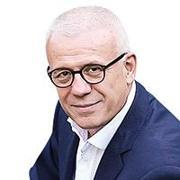Who won the war in Gaza?
Paylaş
The AFP newsagency reported a very interesting piece of news on February 5 that was also published in Hurriyet daily the following day.
I didn't check to see how the other newspapers covered it.�
An institution, known as the "Jerusalem Media and
It is an Israeli institution.
One of the questions asked in the survey was this:
"Who won the war in
According to the survey results a total of "53.2 percent" of respondents living in the
So, who won the war according to those living in
Only "35.2 percent" of the respondents living in
Isn't it interesting that there is nearly 20 points difference between the two results?
While just one third of those living in the region who personally faced the sorrows of war, say "We won the war", as more than half of those living in
* * *
After seeing these results one automatically thinks and asks the question, what does it mean "to win a war"?
Looking at this survey, it is clear that the meaning of "winning a war" is different for everyone.
Palestinians reside in both regions.
But it is more difficult for a person who has lost a child, their home and lived the bombs exploding, to say: "We won the war".
Although the man on the street says, "Anyway, we resisted, and this sacrifice had to be made," the situation changes when it comes to an assessment of the damage.
* * *
There is another interesting result in the same survey.
Palestinians residing in both regions were asked the question:"Who would you support if an election were held today?"
Take note of the results:
A total of 28 percent of those living in
In other words, in
What about the situation in
The opposite situation exists there.
While support for Hamas rose to 29 percent, it remained at 24 percent for Fatah.
In other words, while support for Hamas fell in bombed
It is also being said that support for Turkish Prime Minister Tayyip Erdogan also increased after he argued on behalf of Hamas in Davos.
This means that the Israeli offensive increased the votes of those who were not the target of bomb attacks.
But it reduced support for Hamas in
Some may not trust the results of the survey since it was carried out by an Israeli-based institution.
But, we received the results of separate survey conducted by a Palestinian research company.
According to that survey, while support for pro-peace Fatah increased to 40.6 percent, it fell to 31 percent for Hamas.
This support reportedly rose to 51 percent last November.
The figures reveal that a total 56 percent of Palestinians living in
* * *
But the most import result is this:
A total of 88 percent all Palestinians want a ceasefire and peace.
In other words, they want neither the Israeli offensive nor missile attacks from Hamas.
How should we evaluate these results?
The residents of
On the contrary, they say that Hamas is taking the wrong path.
It is being said that support for Erdogan, who made that "historic move" is rising in
So, whose policy is beneficial and correct?
Arab countries such as
Or,
* * *
The suffering
They showed immense bravery.
Anyway, aside from them, there is no need for anyone else to write epics about their bravery.
It is now time for the power of rhetoric to reveal its impact on thinking.
Let's also answer this question sincerely.
Who reflects the real sentiment of the Palestinian public? Hosni Mubarak, the president of
Paylaş








